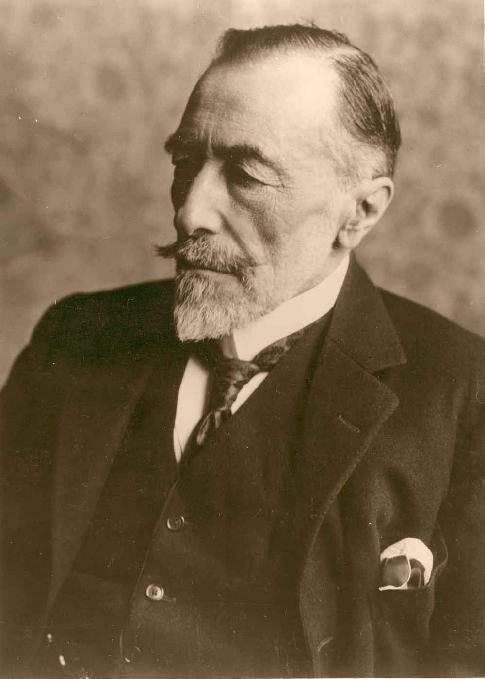
Joseph Conrad
Reading Achebe's essay my interest sparked and completely ignited the more I read on. I could sense this deep passion within Achebe's words and I sensed a very deep offense.
When I googled the name Joseph Conrad and I saw the picture, I was instantly filled with answers and my own assumptions of where Achebe was coming from. I understood Achebe as he explained that Conrad was not holding his best interest in his novel.
"Is Conrad saying then that these two rivers are very different, one good, the other bad? Yes, but that is not the real point. It is not the differentness that worries Conrad but the lurking hint of kinship, of common ancestry. For the Thames too "has been one of the dark places of the earth." It conquered its darkness, of course, and is now in daylight and at peace. But if it were to visit its primordial relative, the Congo, it would run the terrible risk of hearing grotesque echoes of its own forgotten darkness, and falling victim to an avenging recrudescence of the mindless frenzy of the first beginnings. "
"We were wanderers on a prehistoric earth, on an earth that wore the aspect of an unknown planet. We could have fancied ourselves the first of men taking possession of an accursed inheritance, to be subdued at the cost of profound anguish and of excessive toil. But suddenly as we struggled round a bend there would be a glimpse of rush walls, of peaked grass-roofs, a burst of yells, a whirl of black limbs, a mass of hands clapping, of feet stamping, of bodies swaying, of eyes rolling under the droop of heavy and motionless foliage. The steamer toiled along slowly on the edge of a black and incomprehensible frenzy. The prehistoric man was cursing us, praying to us, welcoming us -- who could tell? We were cut off from the comprehension of our surroundings; we glided past like phantoms, wondering and secretly appalled, as sane men would be before an enthusiastic outbreak in a madhouse. We could not understand because we were too far and could not remember, because we were traveling in the night of first ages, of those ages that are gone, leaving hardly a sign -- and no memories.
The earth seemed unearthly. We are accustomed to look upon the shackled form of a conquered monster, but there -- there you could look at a thing monstrous and free. It was unearthly and the men were .... No they were not inhuman. Well, you know that was the worst of it -- this suspicion of their not being inhuman. It would come slowly to one. They howled and leaped and spun and made horrid faces, but what thrilled you, was just the thought of their humanity -- like yours -- the thought of your remote kinship with this wild and passionate uproar. Ugly. Yes, it was ugly enough, but if you were man enough you would admit to yourself that there was in you just the faintest trace of a response to the terrible frankness of that noise, a dim suspicion of there being a meaning in it which you -- you so remote from the night of first ages -- could comprehend.
Herein lies the meaning of Heart of Darkness and the fascination it holds over the Western mind: "What thrilled you was just the thought of their humanity -- like yours .... Ugly." "
It makes me wonder what aim was be taking and the best interest that was proposed to be served. If the story of abuse was told through a white man to help serve purpose of awareness to those in the world who have no view or distorted of what took place, can he disguise his innocence in adjectives that don't compliment the plot?
I agree with Achebe in a sense that a man is telling a story that is his roots and not the authors, without any real sense of background. It's not that a white man can't tell the story of the brutality and abuse of the Africans, but I'm just saying, haven't white men said enough?
I feel that you can't right the story through someone else's view properly with just a desire to tell a story. I agree with Achebe that maybe Conrad's stance has no floor to hold it. How well does Conrad know about the backrgound of this people and how aware is he of their present?
I just feel like the best interest weren't necessarily served, and I wouldn't haven been able to see that without reading this essay.

1 comment:
I truly agree with you. No one can tell your story better than you. Even though I think that Conrad had his own, sometimes twisted way of describing and explaining things. He tried, and I am not sure if I honestly think that he did a good job at it at all. His own thought and past clearly was present throughout the whole novel, and I am happy that Archebe picked up on that and so much more.
Post a Comment